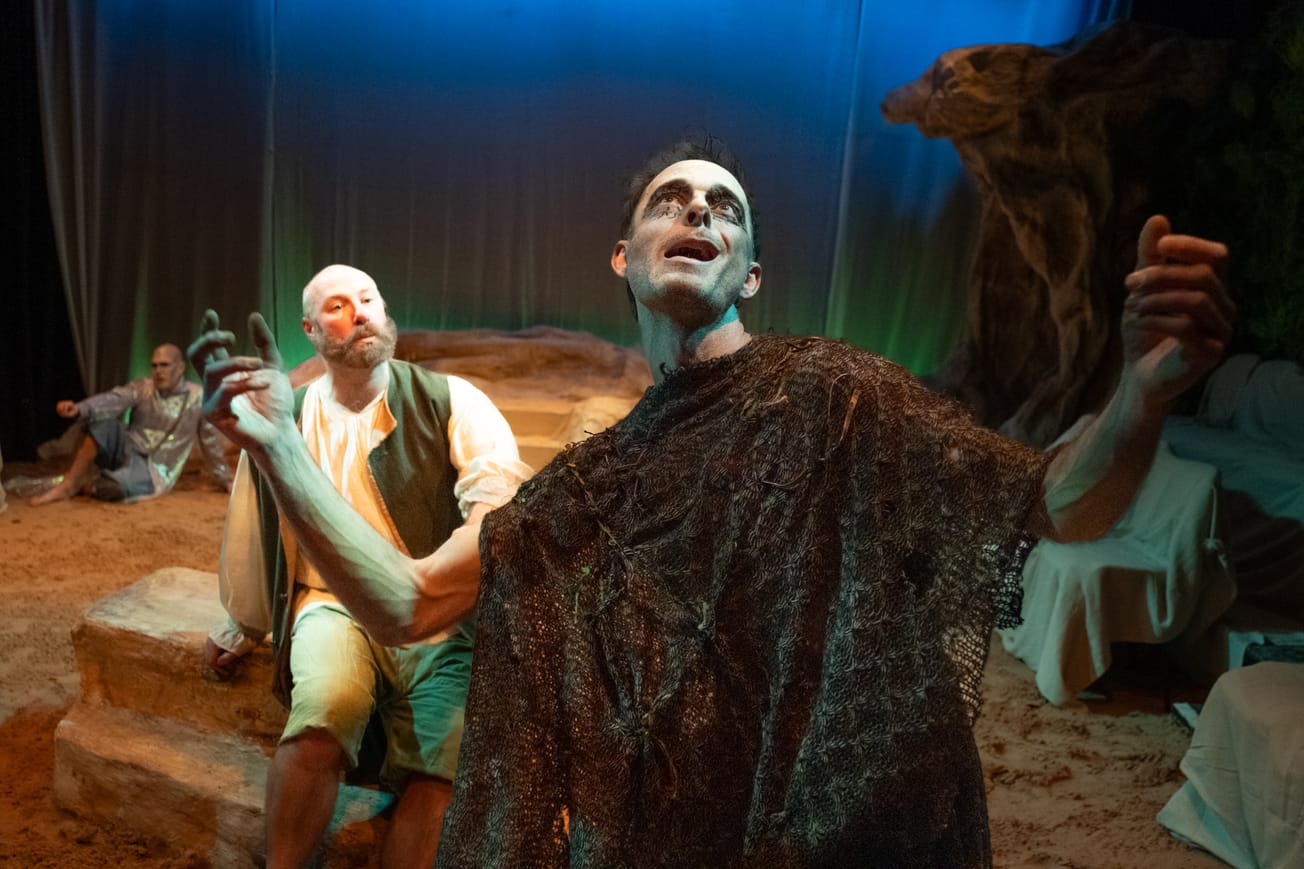By Milan Perera, Second Year English
‘There is a little bit of the whore in all of us... (just a matter of) your price?’ mused the late Australian media magnate Kerry Packer regarding integrity. It is almost disquieting to think that there could be a price tag attached to things we hold in the highest esteem such as truth, beauty, honour, and integrity. These were the perennial questions that came under scrutiny in the production of Wall(s).
After their critically acclaimed production of Manosphere, the University of Bristol Drama Society (DramSoc) trod the boards once more with another ground-breaking theatre spectacle.
In the summer of 2021, the directors, Yannis Megalou and Joe Hayward turned their gaze towards continental Europe for inspiration, where they found a hidden gem in the evocative short story, Le Mur (The Wall) by Jean-Paul Sartre. The duo adapted Sartre’s short story seamlessly into any period of time while amplifying the existentialist elements embedded in Sartre’s opus.
Sartre sets his story during the Spanish Civil War which ravaged the country between 1936-1939. The original story revolves around three political prisoners who are sentenced to be shot by the firing squad the following morning. But there is a way out. If they divulge information on the whereabouts of a wanted anarchist leader, they will be spared. As the prisoners stare at a prison wall awaiting their inevitable end, their minds are running wild with conflicting emotions.
Under the direction of Megalou and Hayward the number of prisoners is increased to five as opposed to Sartre’s three. While three prisoners occupy the centre stage (Roberto, Henry and Nico), the remaining prisoners provide a crucial impetus to the progression of the play, much akin to the chorus in a Greek Tragedy. In short, they provided a vital conduit between the central action and the audience. Lizbeth Lambert and Manisha Premlal stepped up to the challenge with ease and captured the range of emotions running through heads of the prisoners who are staring into the abyss of death.
Samuel Dix opened the proceedings with a haunting monologue which set the tone for the evening with his catatonic counting. Stan Abbott-Stacy and Lily Camyab played the menacing and unfeeling prison guards to perfection with the brisk movements and low-pitched staccato voices. Abbott-Stacy who produced Manosphere to critical acclaim in spring term proved to be equally at home with acting, as it happens.

A doctor is appointed overnight to oversee the prisoners under the guise of providing them with support in the wake of their executions. But this is an attempt to garner any information possible from the lips of prisoners who are faced with death. Julia Pecyna excelled in combining the caring physician and the calculated mole into one.
Three main prisoners represent three levels of seniority in the revolutionary activities. Alfie Walsh who plays the titular character of Roberto is a seasoned revolutionary who has seen death and destruction up close. Walsh deftly captures the kaleidoscope of emotions associated with a revolutionary leader from callous indifference, unwavering faith in the revolutionary cause to the tender ardour for his sweetheart, Marie. Kate Hunter played the character of Marie to a tee by capturing the melange of emotions running through the head of a lover of a wanted ‘criminal.’
The second prisoner in seniority, Henry was played by Kira Howe with empathy and nuance as required. She has taken part in active combat and recounting the number of enemies that fell at her feet with almost sardonic relish. But it comes to pass that she enrolled with the movement with trepidations as she had aspirations beyond conflict such as playing professional football. Howe managed to capture these conflicting emotions with a masterly precision.
Review: ‘Romeo and Juliet’ by Bristol Shakespeare Society @ Clifton Hill House Theatre
Review: ‘Days @ Dear Old Brizz’ by Music Theatre Bristol @ Alma Tavern Theatre
Benjamin Oliveira who plays Nico (the youngest prisoner) had a particularly challenging thespian assignment as his demeanour evolved through the play. He played no part in revolutionary activities. He is there instead of his wanted revolutionary sibling. At the beginning of the play Nico was shy, timid, and obsequious. As the play reached its crescendo, he transforms into rational, angry and confrontational individual who questions everything. Oliveira was mercurial in the execution of directors’ vision for the character.
Fran Davidson brilliantly doubled up as Jose and a civilian role while the Brit School alumni Andrew Graham sent the transfixed audience into a wave of laughter as he portrayed the bumbling Lieutenant.
Edie Dacosta Jackson embodied the revolutionary zeal and magnetism of the wanted revolutionary leader while Matthew Carver looked every inch an unforgiving, callous, and calculated Major who would not rest until every rebel is slain. His gait, the purposeful walk, and the twitching of facial muscles with rage and indignation captured the essence of the character with a nimble ease.
The directors skilfully used the wall as a symbol for the separation between life and death, separation between condemned and free and finally, it represents brute matter, which contrasts with consciousness, and to which the men will be reduced when shot. The ending was unexpected and reduced the astonished audience to a pin drop silence. The eerie silence then turned into a standing ovation which proved to be a seal of approval of a thoroughly enthralled audience.
Speaking to Epigram afterwards, the directors Megalou and Hayward were beaming with pride as the project they painstakingly laid down last summer finally came into fruition with an astonishing reception. The producer Cecelia Quant, who they thanked ceaselessly, functioned as the creative glue which held the ensemble together as they navigated challenges leading up to the production.
Featured Image: DramSoc








